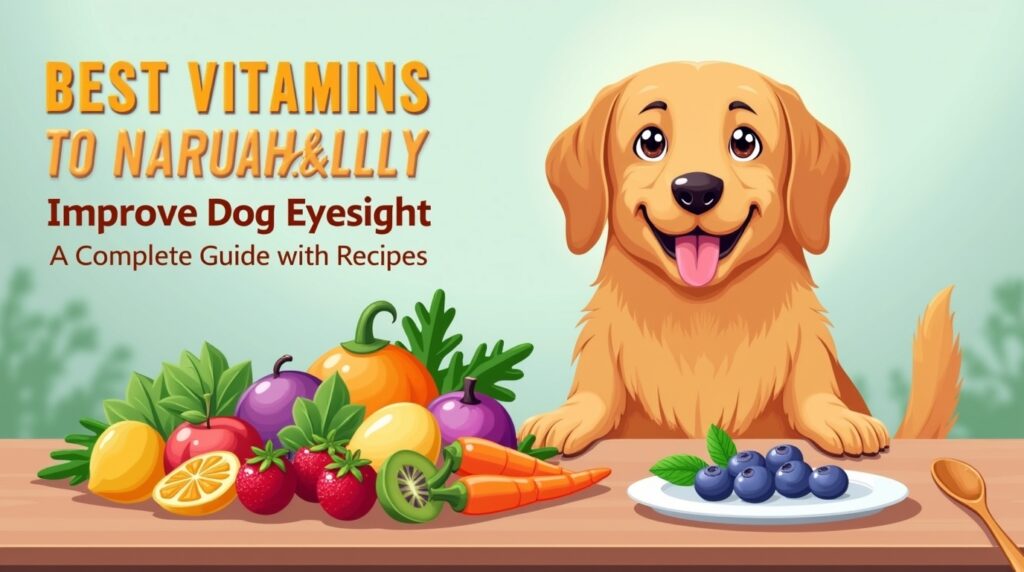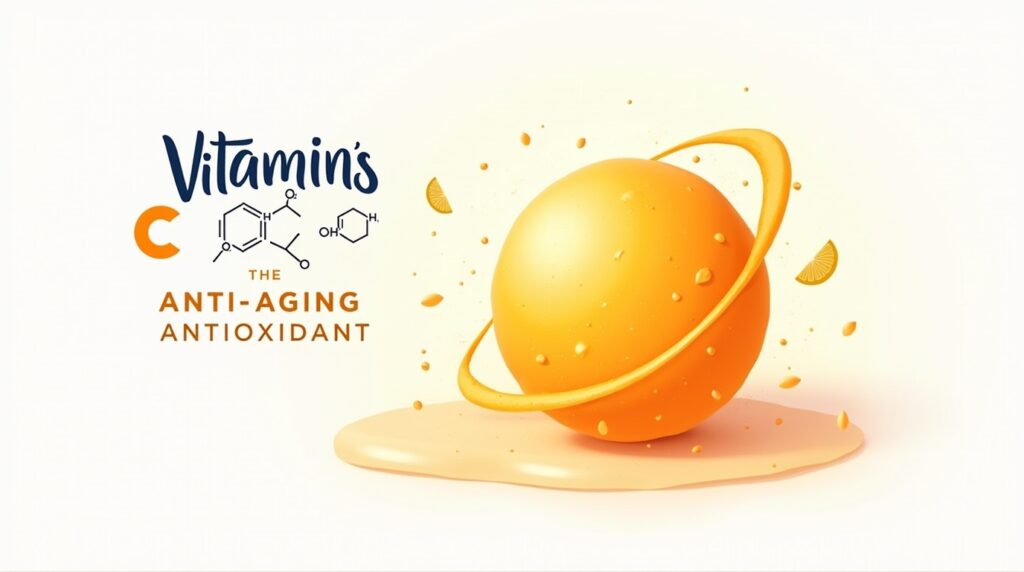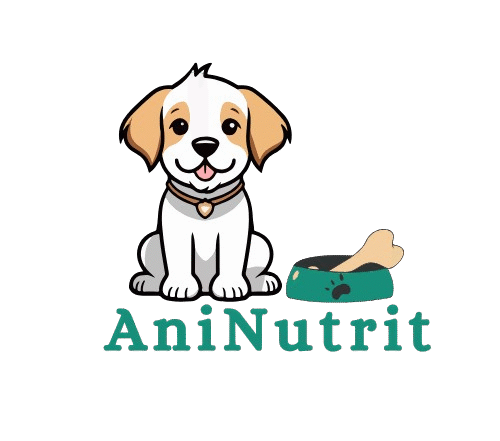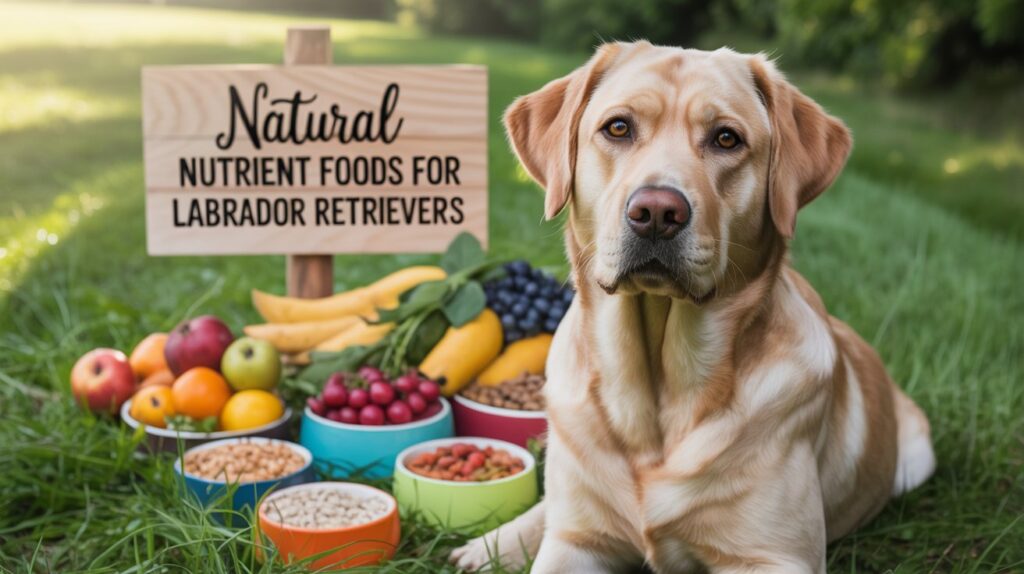Supporting your dog’s vision health is just as important as taking care of their joints, coat, or digestive system. Just like humans, dogs rely on specific vitamins and nutrients to maintain sharp eyesight and prevent common eye disorders as they age. In This article we will explores the best vitamins for canine vision, their food sources, and how to incorporate them into delicious, eye-friendly recipes. you also read about Animal Nutrition Supplements: Boosting Health and Performance.

How you can naturally improve your dog’s eyesight with the right nutrition vitamins.
1. Vitamins A – The Vision Powerhouse
Vitamin A is one of the most essential nutrients for your dog’s eye health. It plays a critical role in forming rhodopsin, a pigment in the retina that helps dogs see in low light. Without sufficient Vitamin A, dogs may experience night blindness or dry, irritated eyes.
Natural Sources of Vitamin A:
- Carrots (rich in beta-carotene)
- Sweet potatoes
- Pumpkin
- Liver of different animals (especially beef or chicken liver)
- Spinach (in moderation)
Why It Matters
Vitamin A acts as an antioxidant, fighting free radicals that can damage eye cells. these vitmains not only does it preserve vision, but it also supports the immune system and skin health of animals.
Dog-Friendly Vitamin A Recipe: Carrot & Liver Dog Treats
Ingredients:
- 1 cup cooked and mashed carrots
- ½ cup finely chopped chicken liver (cooked)
- 1 egg
- 1 cup oat flour
Instructions:
- Preheat oven to 350°F (175°C).
- Mix all ingredients into a dough.
- Roll into small balls and flatten slightly.
- Bake these ingredients for 25 minutes until firm.
These treats are loaded with beta-carotene and retinol — perfect for a vision-boosting snack!
2. Vitamins C – The Anti-Aging Antioxidant
Although dogs also produce Vitamin C on their own external wastegae. particularly additional supplementation can offer many benefits — especially for eye health. This vitamin combats oxidative stress, which is often linked to age-related eye diseases like cataracts.

Natural Sources of Vitamin C:
- Blueberries
- Strawberries
- Kale
- Broccoli
- Parsley
How It Helps
Vitamin C supports collagen production and keeps blood vessels around the eyes strong. these vitamins It’s also effective in reducing inflammation. addwhich can affect both the eyes and the joints.
Blueberry-Kale Pup Smoothie
Ingredients:
- ½ cup blueberries
- ½ banana
- 1 kale leaf (stem removed)
- ½ cup plain Greek yogurt
Instructions:
Blend all ingredients until smooth.
Serve as a treat or food topper.
This colorful smoothie is rich in antioxidants, helping to protect your pup’s precious peepers.you also read about Balanced Animal Diet .
3. Vitamin E – The Cellular Defender
Next on the list is Vitamin E, a fat-soluble vitamin known for protecting cell membranes — especially in the eyes. Dogs with low Vitamin E levels may be more prone to eye diseases such as retinal degeneration.
Natural Sources of Vitamin E:
- Sunflower seeds (in moderation)
- Almond butter (xylitol-free)
- Wheat germ oil
- Spinach
- Eggs
Benefits Beyond Vision
While Vitamin E is essential for eye health, it also supports the heart, skin, coat, and reproductive system.
Spinach & Egg Muffins
Ingredients:
- 2 eggs
- ½ cup chopped spinach
- 1 tbsp wheat germ oil
- 2 tbsp oat flour
Instructions:
Preheat oven to 325°F (163°C).
Mix all ingredients and pour into silicone muffin cups.
Bake for 20 minutes or until firm.
With Vitamin E and lutein from spinach, these muffins are a powerhouse for your dog’s eyes.
4. Omega-3 Fatty Acids – Fat That Fights Inflammation
Although not a vitamin, omega-3 fatty acids are critical for supporting dog eye health. DHA, in particular, is crucial for retinal development in puppies and for preserving vision in older dogs.
- Sources of Omega-3:
- Salmon
- Sardines
- Anchovies
- Flaxseed oil (in small doses)
- Chia seeds
- Vision Benefits
Omega-3s help reduce inflammation and dry eyes, improve tear production, and support cognitive function — all of which benefit aging dogs.
Salmon Patties for Dogs
Ingredients:
- 1 cup cooked salmon (skin removed)
- ½ cup mashed sweet potato
- 1 egg
- 1 tbsp ground flaxseed
Instructions:
Mix ingredients and form into patties.
Cook in a skillet over medium heat for 3–4 minutes per side.
These patties are not only tasty but rich in DHA for strong, clear vision.
5. Lutein & Zinc – The Vision-Specific Duo
Rounding out our list are lutein and zinc, a powerful combination often used in eye supplements for dogs. these two vitmins Lutein and zinc carotenoid found in green vegetables. while zinc plays a key role in transporting vitamin A to the retina.
Sources of Lutein:
- Kale
- Spinach
- Egg yolks
- Broccoli
- Sources of Zinc:
- Beef
- Pumpkin seeds (unsalted, ground)
- Chickpeas (cooked, plain)
- Benefits
Lutein filters harmful blue light and protects the retina, while zinc supports overall retinal health and immune function.
Green Vision Mash
Ingredients:
- ½ cup steamed kale
- 1 hard-boiled egg (chopped)
- 2 tbsp ground beef (cooked)
- 1 tsp ground pumpkin seeds
Instructions:
Combine ingredients and mash lightly.
Serve as a food topper or side dish.
Packed with lutein, zinc, and egg yolk — this mash is a vision-loving meal addition!
Final Thoughts: Nutrition Is Key to Canine Vision
- To sum it up, the best vitamins for dog eyesight include:
- Vitamin A for retinal function
- with Vitamin C for antioxidant protection
- Vitamin E for cellular defense
- Omega-3s for inflammation control
Lutein & Zinc for retina and lens support:
Adding these nutrients through whole foods or vet-approved supplements can significantly improve your dog’s eye health naturally. Moreover, these recipes are not only beneficial but also enjoyable for your furry friend.
Remember to transition gradually when introducing new foods and always consult your veterinarian before starting new supplements — especially if your dog has existing health conditions.
FAQs on Vitamins for Dog Eye Health
1. Can dogs take human eye vitamins like lutein?
It’s best to use dog-formulated supplements. While lutein is safe, dosage and additives in human products may be harmful.
2. How do I know if my dog has vision problems?
Watch for signs like bumping into objects, cloudy eyes, hesitation in low light, or redness and discharge.
3. Can too much Vitamin A harm my dog?
Yes. Excess Vitamin A can be toxic. Use liver or supplements in moderation.
4. Are there specific breeds prone to eye issues?
Yes — Pugs, Shih Tzus, and Spaniels often develop eye conditions like cherry eye or cataracts.
5. Should I give my dog Omega-3 daily?
Yes, in vet-approved doses. Fish oil or salmon-based foods are ideal.
6. Is spinach safe for dogs?
In moderation. It contains oxalates, which in large amounts can affect kidney function.
7. What’s the best age to start eye supplements?
Start as early as puppyhood to support retinal development and continue through senior years.
8. Can homemade food improve dog eyesight?
Absolutely. Balanced recipes with key nutrients can support vision and overall health.
9. What’s a good commercial supplement for dog vision?
Look for products containing lutein, DHA, and Vitamin A — consult your vet for brand suggestions.
10. Can dogs get cataracts from poor nutrition?
sometimes While genetics plays a role in a lack of antioxidants like Vitamin C and E may contribute.


